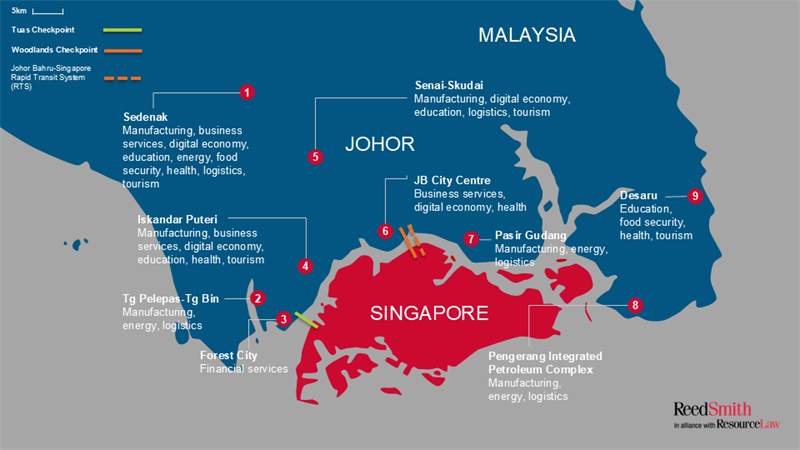Introduction
On 7 January 2025, Malaysian Prime Minister Anwar Ibrahim and Singaporean Prime Minister Lawrence Wong signed an agreement to establish the Johor-Singapore Special Economic Zone (JSSEZ).
This agreement sets out the broad parameters and areas of cooperation for the JSSEZ. The JSSEZ aims to strengthen the value proposition of both countries by leveraging their complementary strengths and enhancing cross-border trade, investment and people mobility.
Zones and economic sectors
The JSSEZ is a special economic zone in Malaysia’s southern state of Johor. It is intended to span a total area of over 3,500 square kilometres, which is comparable to the combined size of Shenzhen and Hong Kong SAR. The development of the JSSEZ will be spearheaded by the Malaysian Investment Development Authority, Invest Johor and the Iskandar Regional Development Authority, with the Invest Malaysia Facilitation Centre Johor (IMFC-J) being set up to streamline and expedite the application processes for various approvals and licences required for foreign businesses setting up in the JSSEZ.

The JSSEZ will comprise nine flagship zones, focusing on 11 priority sectors that enhance economic complexity, promote and advance digital vibrancy and technology adoption, and support net-zero aspirations. These sectors are manufacturing, logistics, food security, tourism, energy, digital economy, green economy, financial services, business services, education and health.
Incentives and initiatives
Cross-border trade, investment and people flows between Singapore and Malaysia have been growing steadily prior to the establishment of the JSSEZ. One example is the growth of data centres to service Singapore operations and even artificial intelligence solutions for a global user base. However, some businesses and individuals have cited concerns, including checkpoint congestion and the availability of skilled workers in Malaysia.
To attract business and individuals, the JSSEZ offers incentives and initiatives including:
- A special corporate tax rate of 5% for up to 15 years for companies undertaking new investments in high-growth and high-value-added activities within the JSSEZ.
- A concessionary personal income tax rate of 15% for up to 10 years for eligible knowledge workers employed in the JSSEZ.
- A reduction of entertainment duties to boost tourism and leisure-related investments in the JSSEZ.
- Improved transport infrastructure and connectivity, such as the Johor-Singapore Rapid Transit System Link, which will connect Johor and Singapore by end-2026 and cut travel time from hours to as little as 15 minutes, and the potential revival of the Singapore-Kuala Lumpur high-speed rail project, which will further boost regional connectivity and tourism.
- A passport-free QR code clearance system to expedite the movement of people at land checkpoints on both sides of the border (current QR code clearance systems are limited to only one side of the border).
- A digitised cargo clearance process to facilitate the cross-border movement of goods at land checkpoints.
- A renewable energy cooperation framework to support Singapore's green energy transition and Malaysia's renewable energy development.
- Training and work-based learning programmes to address talent and skills gaps in industries relevant to the JSSEZ.
The private sector has started responding in anticipation of these incentives and initiatives. For example, one leading Singapore bank has entered into an agreement with the Singapore and Malaysia chambers of commerce to boost collaboration and investment opportunities, while a Hong Kong-listed battery maker has entered into a letter of intent to build a manufacturing and research facility in the JSSEZ.
The JSSEZ is also pioneering a new development approach whereby infrastructure will be built on a “project-by-project” basis, with investors and the Malaysian government reaching agreement on the corresponding projects and investments. While the approach aims to minimise wastage of resources and to be more flexible in addressing changing investor needs, investors should be mindful of potential uncertainties from construction delays and red tape.
Conclusion
The JSSEZ offers new possibilities for firms to expand and synergise operations across both Singapore and Malaysia. International investors should closely monitor further announcements regarding specific incentives and regulatory frameworks within the JSSEZ. There will be many investment opportunities throughout the lifecycle of the “project-by-project” development approach if investors deftly navigate ongoing developments.
Reed Smith LLP is licensed to operate as a foreign law practice in Singapore under the name and style Reed Smith Pte Ltd (hereafter collectively, "Reed Smith"). Where advice on Singapore law is required, we will refer the matter to and work with Reed Smith's Formal Law Alliance partner in Singapore, Resource Law LLC, where necessary.
Client Alert 2025-098

